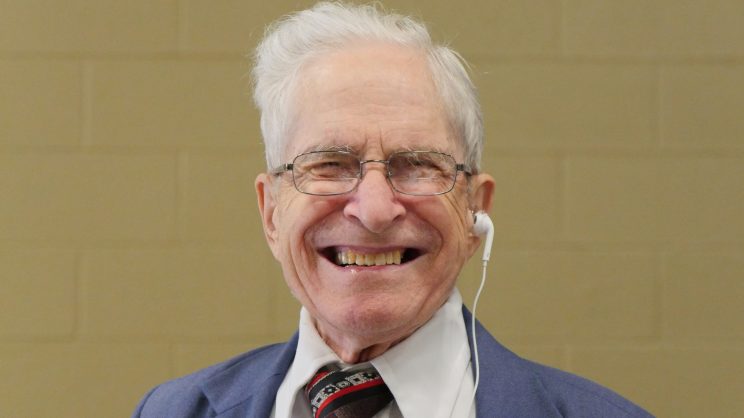Following a stroke, 94-year old Mr. Sam from Mississippi needed some transition time in a rehabilitation center. Imagine his family’s frustration when application after application was rejected…because the rehab facilities were not willing to provide a sign language interpreter for Mr. Sam who is Deaf and uses American Sign Language (ASL). “It was unreal”, said Mr. Sam’s son, Craig Samuels, “we even had a verbal ‘yes’ from one facility only to have that’ yes’ turn into a ‘no’ when they learned that their offer of a whiteboard would not adequately serve my dad’s post-stroke communication needs. It was a nightmare.”
And, as the Samuels family learned, their experience isn’t uncommon.
Luckily the Samuels family has a network of support that helped them get on the right track and, ultimately, in touch with CREEC. When Mr. Sam went to the Emergency Room after his stroke, he was not initially provided with adequate interpretation. Mr. Sam’s stroke worsened his hearing condition, rendering his hearing aid completely ineffective even for short, simple communications. In addition, the left side of Mr. Sam’s body and his vision were impacted, making simple written whiteboard communication and video ASL interpretation also ineffective. As a result, Mr. Sam could not communicate at all with his health care providers nor they with him without in-person ASL interpretation. A good friend of the Samuels family who is also a Deaf advocate, assured them that Mr. Sam is guaranteed effective communication by law. With his support, they pushed and soon received excellent services for the rest of Mr. Sam’s stay at the hospital.
When it was time to take the next step to a rehab facility, Mr. Sam and his family knew exactly where they wanted him to go, “It’s an excellent center – clean, pleasant, safe, and with a good reputation,” said Theresa Samuels, Mr. Sam’s daughter-in-law. After an initial verbal approval, however, Mr. Sam was denied admission once his interpretation needs were known. Mr. Sam’s case worker at the hospital put together a list of other rehab center options for the family.
The Samuels family, with the help of hospital and social case workers, tried them all. And Mr. Sam was denied admission at all of them.
Deaf Connect of the Mid-South, the interpretation service working with Mr. Sam at the hospital, put the Samuels family in touch with Martie Lafferty. Martie, CREEC’s Accessibility Project Director, spoke with the Samuels family and felt that CREEC could help by using its new Fast Advocacy for Communication (FAC) system. Within two days, Martie had sent a personalized FAC letter to Mr. Sam’s rehabilitation center of choice and, shortly thereafter, the center admitted Mr. Sam with six hours of in-person ASL interpretation provided per day. “Our FAC letters resolve most situations where a medical facility or other business is refusing to provide interpreters. I think that’s because we take an educational approach in these letters and take the time to explain the client’s specific situation and the ADA’s requirements. We also make clear that we’re available to talk with the business about the issue. In this situation, the rehabilitation center quickly reached out to talk with me about Mr. Sam’s communication needs and agreed to provide interpreters during his stay at their facility. We also had a follow up conversation about their specific plans for providing effective communication to Mr. Sam. During these conversations, they noted they had never previously served a Deaf individual but hoped to make the most of this opportunity and to be able to serve other Deaf people in the future. I will follow up with the facility to further encourage them to provide effective communication to other Deaf people in the future.”
“The initial application and denial process was frustrating and demoralizing. We were so worried that we simply wouldn’t be able to get my dad the care he needed,” said Craig, “Martie appeared like an angel and once the FAC process was set in motion, the previous and seemingly insurmountable barriers were removed.” And, with the exception of some scheduling complications at the rehab center, Mr. Sam got the communication and, subsequently, the care that he needed at the rehab center of his choice.
“It was important to us to share our story,” said Theresa. “We’re thankful to Martie and CREEC for helping our family. We also hope that in sharing our experience, we can offer hope and direction for others being denied the accommodations they are guaranteed under the ADA. We want to be part of a broader solution to this systemic problem and felt that sharing both our frustration and our ultimate success would be a step in the right direction.”
Do you or someone you know need help obtaining effective communication in a medical setting?
Learn more about CREEC’s Fast Advocacy for Communication (FAC) Program.
Take a look at CREEC’s Quick Guide to Sign Language Interpreters in Medical Settings.
Email us directly at mailto:FAC@creeclaw.org

